Where does "hunky-dory" come from?
The short answer
“Hunky-dory” likely stems from Frisian honcke (“home”), later paired with a playful “-dory” suffix, and it entered everyday speech with the rise of 19th-century blackface minstrel shows.
The long answer
If you're not familiar with the Americanism, to say something is "hunky-dory" is to say that everything is going alright or just fine.
Caitlin scheduled her newsletter early, made tea, confident all was hunky-dory — until she realized she’d forgotten the "Wikipedia article of the week."
Where does "hunky" come from?
"Hunky" has origins in the West Germanic languages of Frisian, in which "honcke" or "honck" means a house or place of refuge, and "hunk" means corner or nook.
This map shows the present-day distribution of the Frisian languages spoken by ~400,000 people on the southern fringes of the North Sea in the Netherlands and Germany. Dark blue (West Frisian), blue (North Frisian), light blue (East Frisian).
"Frisian languages in Europe" by ArnoldPlaton is licensed under CC BY-SA 3.0.
By the early 1800s, New Amsterdam (later New York) children used “hunk” in their games—and it entered adult slang soon after. It was used in the phrase to "get hunk," as in to be made whole after a loss, appearing in a May 25, 1845 article about a horse race in The Spirit of the Times:
Those who lost their money on Fashion, had two or three chances to “get hunk,” especially on the last day.
An 1859 publication of Bartlett’s Dictionary of Americanisms also defined:
HUNK. [...] 2. (Dutch, honk.) Place, post, home. A word descended from the Dutch children, and much used by New York boys in their play. “To be hunk,” or “all hunk,” is to have reached the goal or place of meeting without being intercepted by one of the opposite party, to be all safe.
By 1861, a humorist writer Charles Farrar Browne began using "hunkey/hunky," especially in the phrase "hunkey boy" to mean good, manly, brave, or noble. Here's an example from a Vanity Fair piece of his from June 15, 1861:
That frame! them store clothes! those nose! Yes, it is me own, me only Moses! He folded her to his hart, with the remark that he was “a hunkey boy.”
Farrar Browne also used "hunky" to describe objects of high value in his writing in 1863:
It was a hunky watch—a family heir loom, I wouldn’t have parted with it for a dollar and sixty nine cents.
By the mid-19th century, "hunky" was being used to describe things as good and fine. But that's only half of the phrase...
Where does "-dory" come from?
There's no definitive origin of why "-dory" was added after "hunky," but we have three main theories.
Theory #1: Reduplication
Many American slang terms use reduplication—repeating part of a word for emphasis. This linguistic element appears in "hotsy-totsy" (meaning very good or attractive), "okey-dokey" (meaning okay), and "hoity-toity" (meaning snobbish).
While there's no firm evidence, it's believed that the "-dory" was added to expand upon the word "hunky."
Theory #2: Western sailors visiting Japan
There is another explanation for "hunky-dory," but it also lacks evidence. It's often claimed that the phrase comes from Western sailors visiting Yokohama, Japan in the mid-19th century.
One of the streets in Yokohama is named Honchodori (roughly translated to main street) and was said to have either been a place with bars and brothels to service Western sailors or a street to guide them back to port. Either way, it's theorized that going to Honchodori could make one feel "hunky-dory."
A street sign in present-day Yokohama, named Honchodori.
"Honcho-dori shopping street Tsurumi, Yokohama" (modified)" by 妖精書士 is part of the public domain.
The timeline works for this theory because Japan opened up to foreign trade in the 1850s, so it's possible that the older slang "hunky" was used in combination with Honchodori to bring a Western word to a Japanese term. (By the way,"dori" means street in Japanese, which makes the phrase confusing to some Japanese-English speakers.) Again this is only a possible, not proven, explanation, as there's no hard evidence linking "hunky-dory" to Japan.
Theory #3: A good boat
Another theory put forward by an online word nerd is that "hunky-dory" could have been a maritime phrase to talk about a good boat. "Dory" is a word traced back to the early 18th century used to refer to a small, flat-bottomed boat used in fishing. So it's not a huge leap to consider that one might have complimented a "hunky" boat in the 19th century. Still, no historical evidence backs this fishy idea.
We'll likely never know for certain why the "-dory" got added to the phrase, but we do know what helped propel the phrase into mainstream American slang. Unfortunately, like with plenty of American history, the phrase "hunky-dory" has a racist past.
How was "hunky-dory" popularized?
As far as I was able to find, the phrase "hunky-dory" started to show up in print and letters as early as the 1860s. The earliest use of “hunky-dory” in print I could find was from the New York Dispatch on May 8, 1864, where it appears in a tongue-in-cheek boxing preview of Generals Lee and Grant, mocking the sensational journalism of the time.
...If he can get in a right or left hander his man will prove a "hunky dory," and come down with his centre on the White House next Fall...
Image source: Library of Congress
"Hunky-dory" (well, "Hunkey Dora," but close enough) is also found in a letter that Civil War Union soldier Henry Warren Howe wrote to his family on November 3, 1864:
Captains Johnston and Ferris are in the hospital at Annapolis, Maryland, and doing well. I send you a sprig of cedar. Mr. B. goes in the morning, and it is late, so I will close. I am “Hunkey Dora.”
Image source: Library of Congress
However the phrase arguably owes its mainstream breakthrough to a heinous (and extremely popular) form of American entertainment at the time—blackface minstrel shows.
If you're unfamiliar with blackface minstrels shows, they were comedic theatrical performances put on by mostly white actors wearing blackface paint acting out racist stereotypes of black and other non-white people.
A 1900 poster showing how a white minstrel actor used blackface to portray a black character.
"Minstrel PosterBillyVanWare edit" by Strobridge & Co. Lith is part of the public domain.
Actors would caricature black people as stupid, lazy, superstitious, and happy-go-lucky to uphold myths of black inferiority. Minstrel shows were especially popular with poorer white audiences because they reinforced a feeling of racial superiority and even convinced viewers they were watching authentic glimpses of plantation life (which, of course, they weren't).
From the 1840s through the 1870s, minstrel shows reigned supreme in American entertainment, and their songbooks and advertisements reveal how numerous celebrated troupes embraced the phrase “hunky-dory.”
Christy’s Minstrels—one of the most widely acclaimed blackface troupes throughout the 1850s and 1860s—featured “hunky-dory” in at least two of their songs:
"Josiphus Orange Blossom"
My name it is Josiphus Orange Blossom,
I'm the gayest colored ge'man in the land.
With the pretty girls I always plays the possum.
I'm a red-hot hunky-dory contraband.
"Hunkey Dorey"
One of the boys am I,
That always am in clover;
With spirits light and high,
‘Tis well I’m known all over.
I am always to be found,
A singing in my glory;
With your smiling faces round,
’Tis then I’m hunkey dorey
Image source: "George Christy (ne Harrington) as Julius Crow" is part of the public domain.
Also around this time, Dan Bryant’s celebrated blackface troupe christened a Native American character “Hun-Kee-Do-Ree”—as shown in a January 22, 1865, New York Dispatch advertisement for the “Hun-kee-do-ree, the Live Ingin” show.
Left: Sourced from The Rucker Archive. | Right: Sourced from the Library of Congress.
Although blackface minstrelsy peaked in popularity in the late 19th century, it endured—and so did “hunky-dory.” For example, a 1931 play-text titled “Hunky-Dory Minstrels” still features the phrase prominently.
Source: Library of Congress.
Although “hunky-dory” likely predates blackface minstrelsy, its rise on minstrel stages and in songbooks from the 1860s onward helped cement it as everyday speech in the United States.
Curious about how the world works?
Today You Should Know is a free, weekly email newsletter designed to help you learn something new every Friday.
Subscribe today 👇
Check out some other curious questions:
Sources
Augustyn, A. (n.d.). minstrel show. Encyclopædia Britannica. https://www.britannica.com/art/blackface-minstrelsy
Ballad of America, Inc. (2022, October 24). Minstrel: Overview. Ballad of America. https://balladofamerica.org/minstrel/
BookBrowsers LLC. (n.d.). Why do we say “Everything is hunky-dory”? BookBrowse.com. https://www.bookbrowse.com/expressions/detail/index.cfm/expression_number/116/everything-is-hunkydory
Cambridge University Press & Assessment. (n.d.). hotsy-totsy. Cambridge University. https://dictionary.cambridge.org/us/dictionary/english/hotsy-totsy
Dictionary.com. (n.d.). hotsy-totsy. Dictionary.com. https://www.dictionary.com/browse/hotsy-totsy
The EtymanTM Language Blog. (2011, November 15). Hunky dory /’hʌŋkɪˌdɔəɹɪ/. The EtymanTM Language Blog. https://etyman.wordpress.com/2011/11/15/hunky-dory-h%CA%8Cnk%C9%AA%CB%8Cd%C9%94%C9%99%C9%B9%C9%AA/
Golden Kellem, B. (2024, March 27). Christy’s Minstrels Go to Great Britain. JSTOR. https://daily.jstor.org/christys-minstrels-go-to-great-britain/
Merriam-Webster. (n.d.). hoity-toity. Merriam-Webster. https://www.merriam-webster.com/dictionary/hoity-toity
Nadarajan, S. (n.d.). A Crosslinguistic Study of Reduplication. Arizona University. https://journals.librarypublishing.arizona.edu/jslat/article/209/galley/203/view/
Stewart, P. and. (2008, June 1). Hunky-dory. Grammarphobia. https://www.grammarphobia.com/blog/2008/06/hunky-dory.html
Wikimedia Foundation. (2025, April 17). Frisian languages. Wikipedia. https://en.wikipedia.org/wiki/West_Frisian_language
Wilton, D. (2021, April 8). hunky dory. Wordorigins.org. https://www.wordorigins.org/big-list-entries/hunky-dory


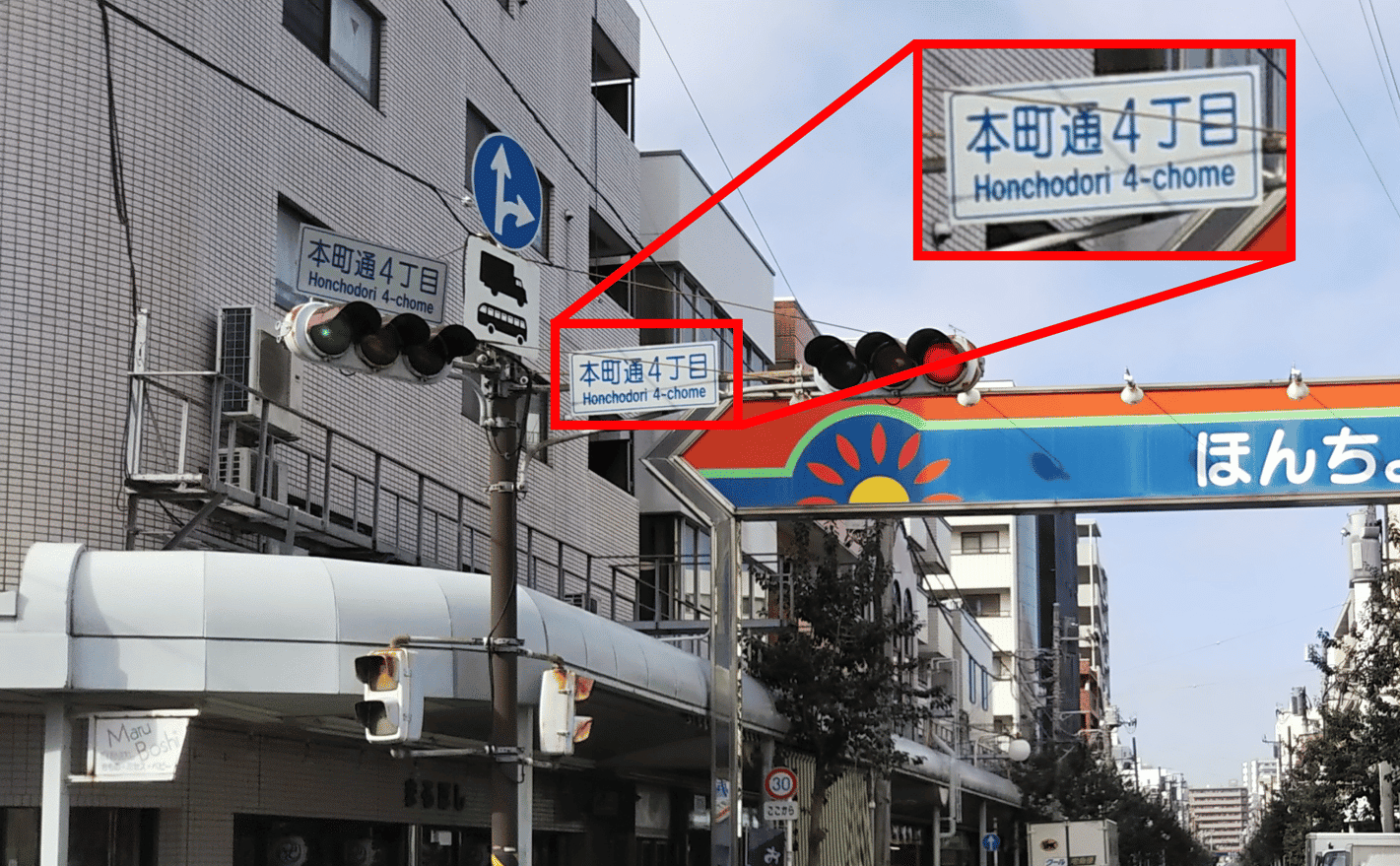
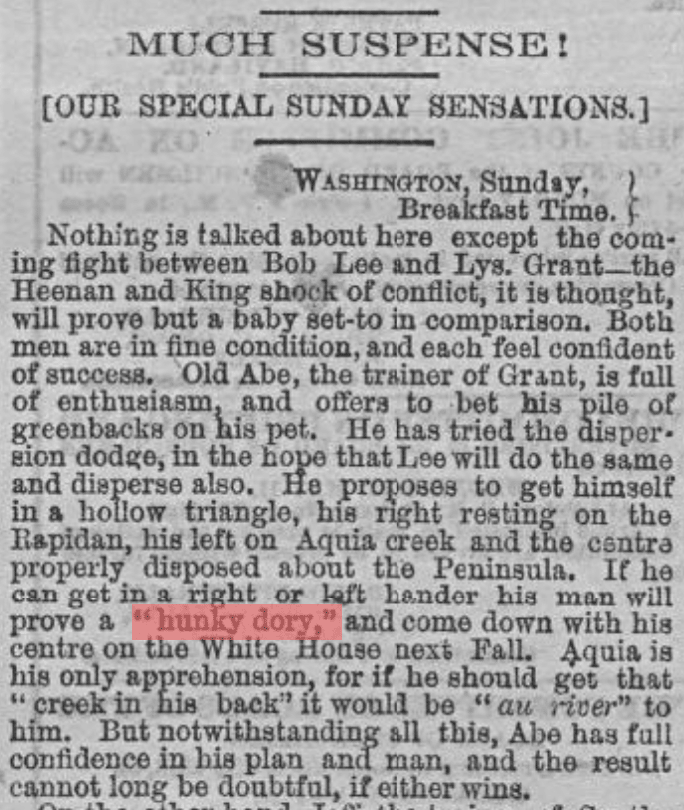
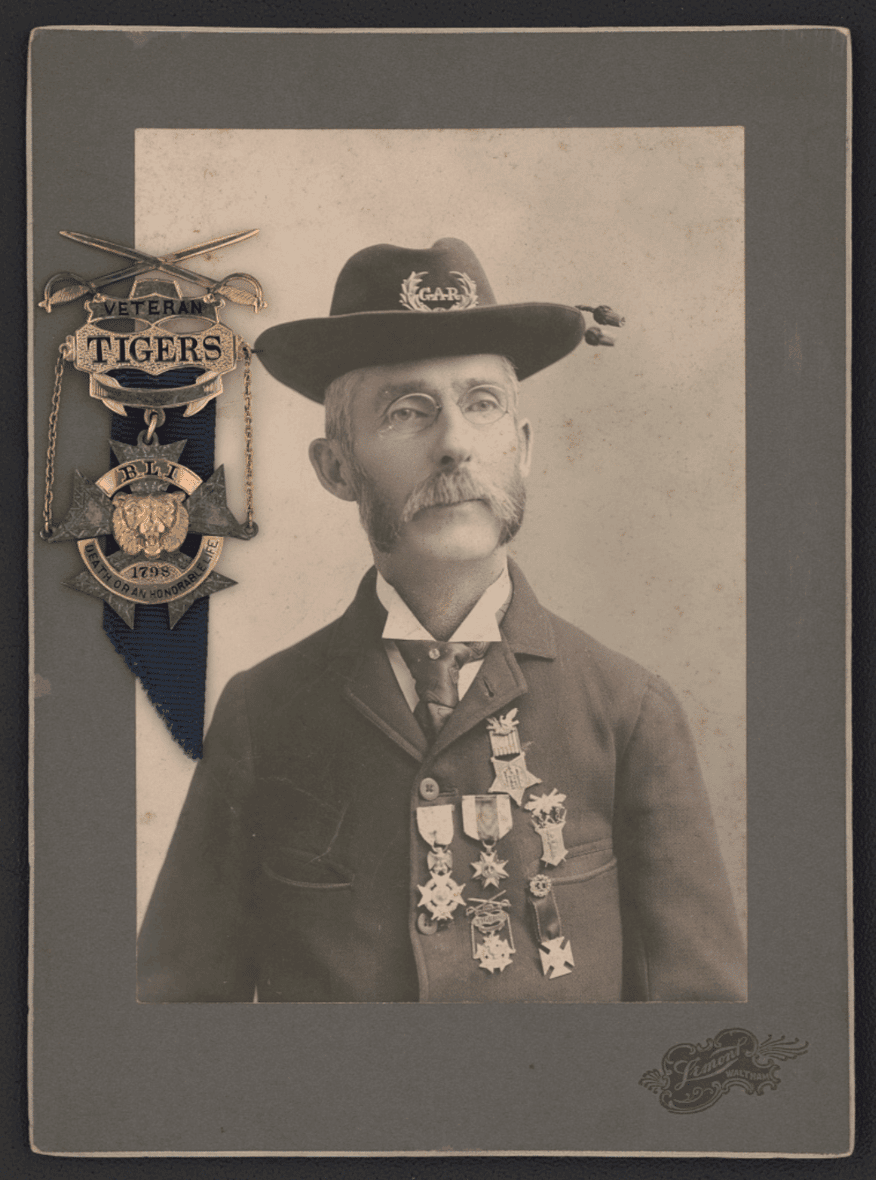
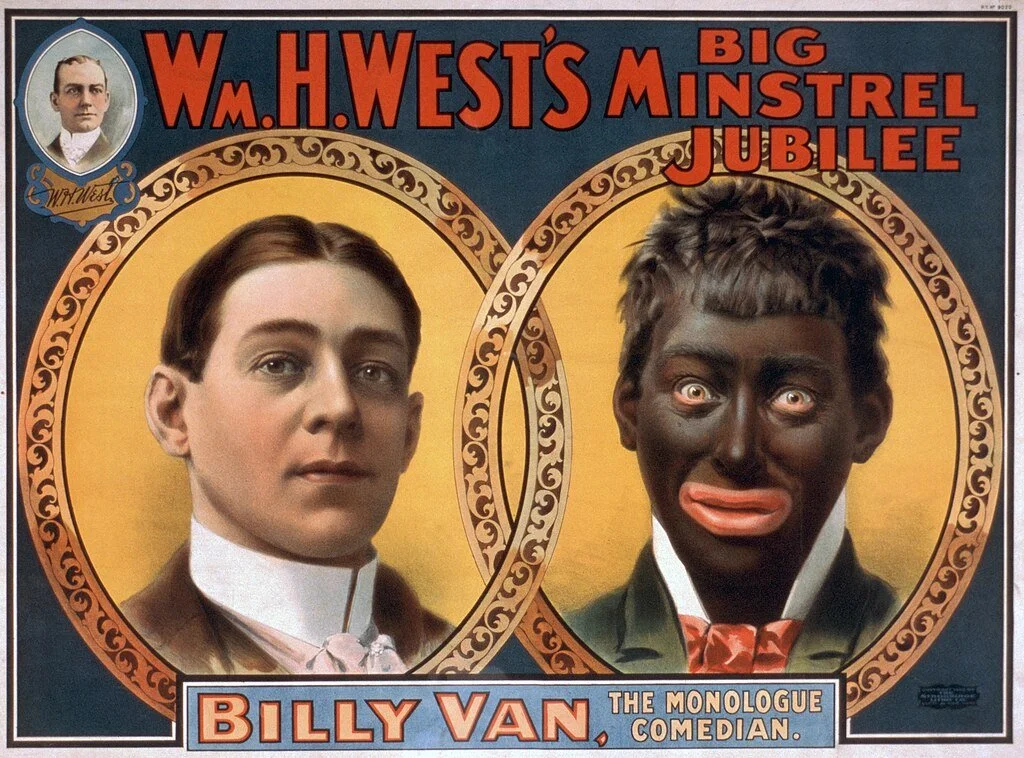
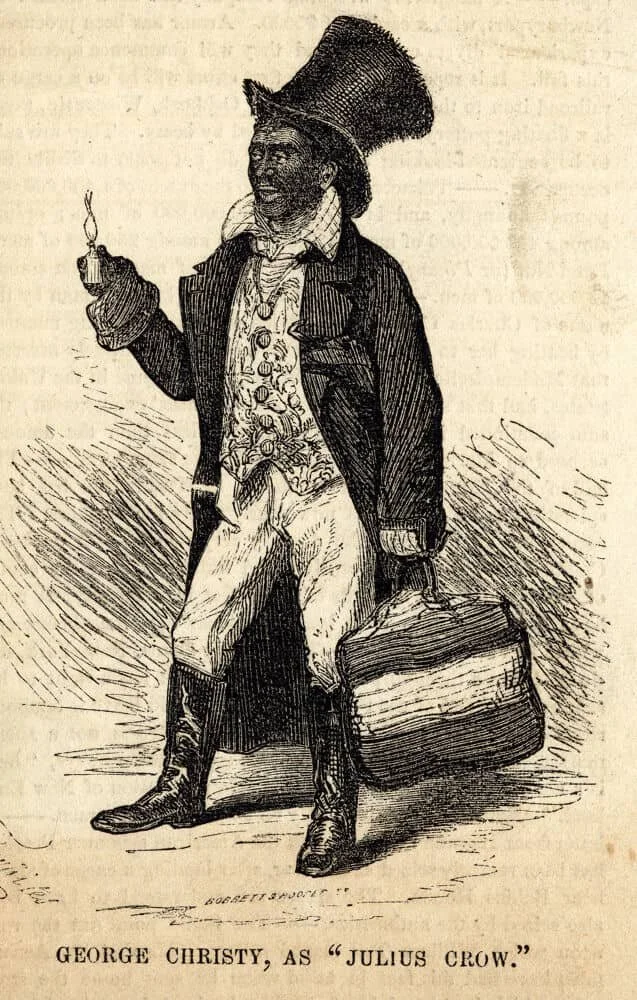


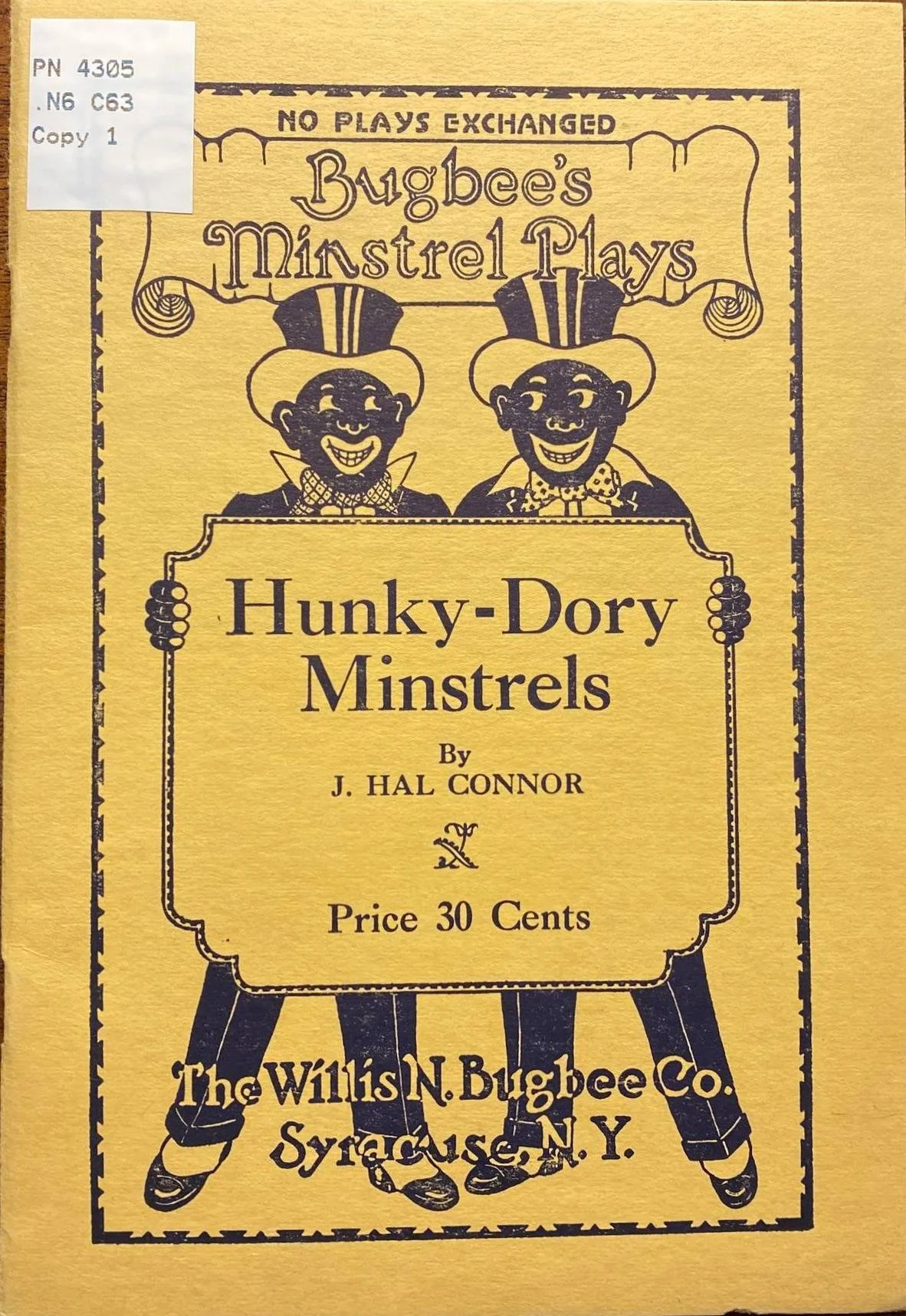
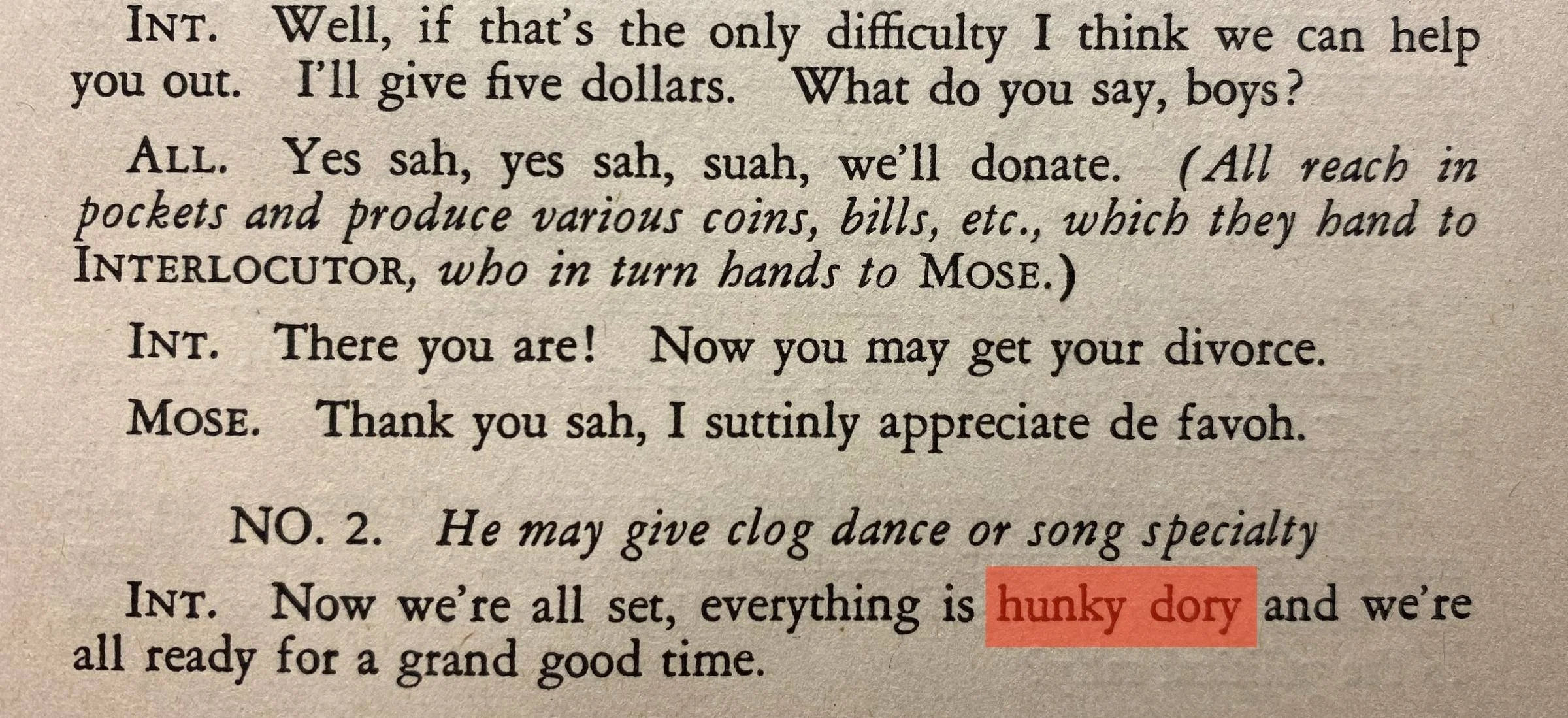


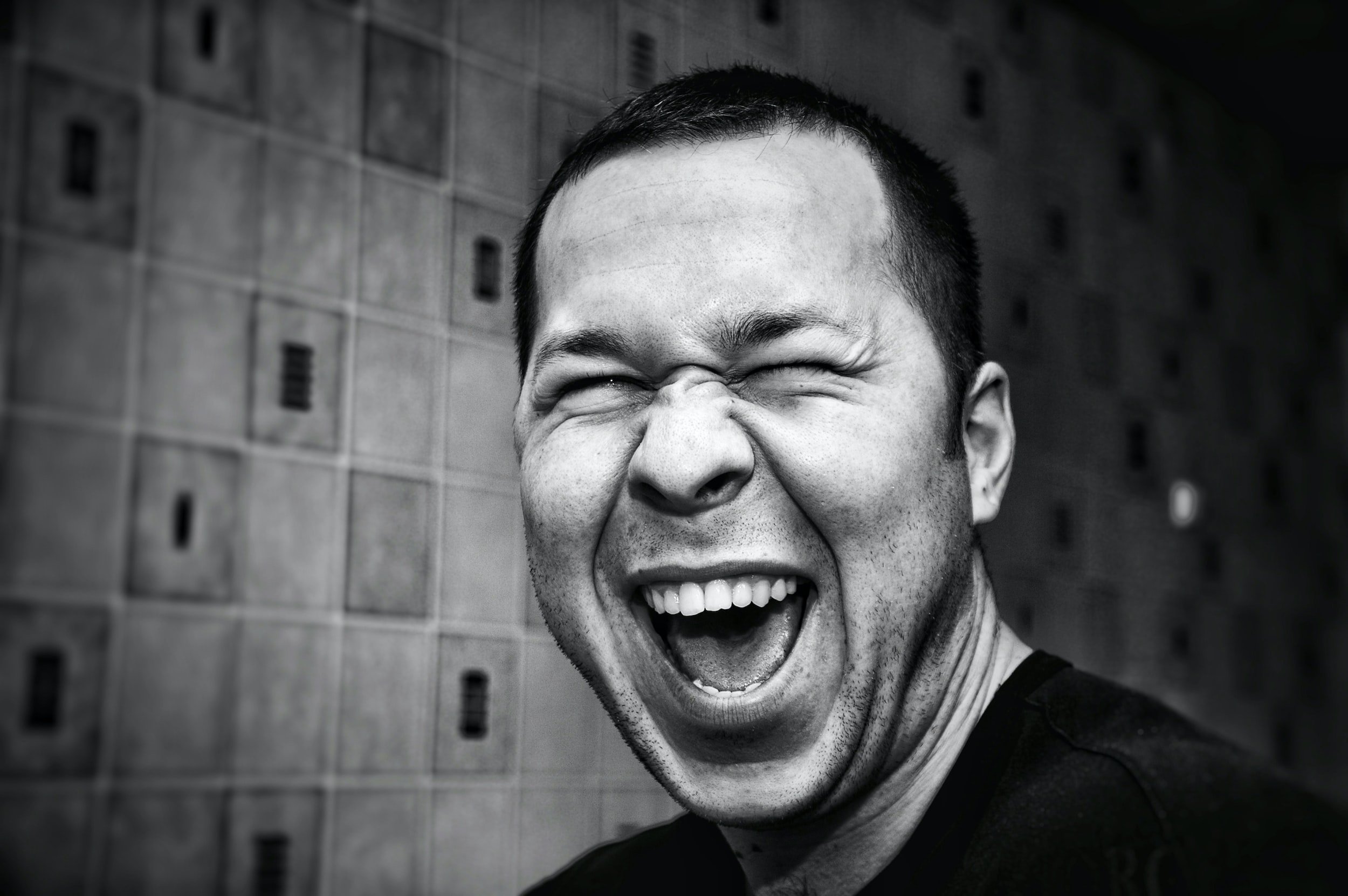
We Americans sure do like American things.